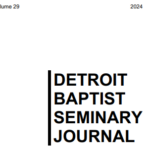23
Nov
2015
Five Theses on the Syrian Refugee Crisis
/
- Christians should be personally sympathetic to the plight of those who are truly persecuted and traumatized by the effects of war, especially those who are innocent of and vulnerable to the atrocities of war. Further, Christians should personally extend benevolence, as they have opportunity, to such persons, giving priority to believers (Gal 6:10).
- The OT speaks well of kindness to disenfranchised “strangers” or foreigners (Exod 22:21; 23:9, etc.). Tempering this fact, however, are dispensational considerations relative to the theocratic state. While the OT surely cannot be used to forbid international benevolence by sovereign nations in the modern era, neither can we use Scripture to require it.
- The OT also speaks to the idea of caution in such situations, too, even approving of holistic ethical cleansing of persistently vicious people groups—including their women and infants (Deut 20:16–18, etc.). Part of the concern seems to be that the children of God’s enemies were likely to grow up to subvert the Jewish nation and scuttle its prevailing religion (Deut 7:1–5). This must of course be understood through a theocratic lens as well, however, and falls far short of a commendation of such action in the modern era. This consideration cannot, however, be wholly dismissed.
- Human governments have in every biblical era had as their foremost biblical obligation the bearing of the sword in the defense and policing of their own constituents (Gen 9:6; Rom 13:1–5), and cannot simply lower this sword in the face of suffering.
- Believers should have mixed sentiments about the current crisis. The situation is far too complex to resolve with hasty arguments ad baculum on the one hand or ad misericordiam on the other.


